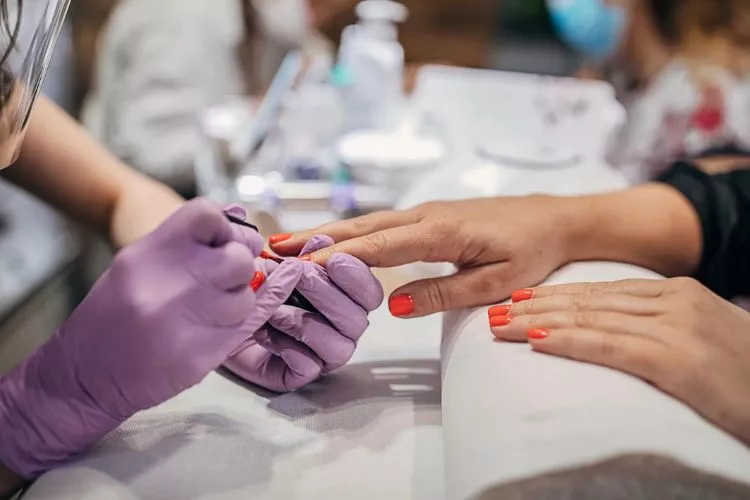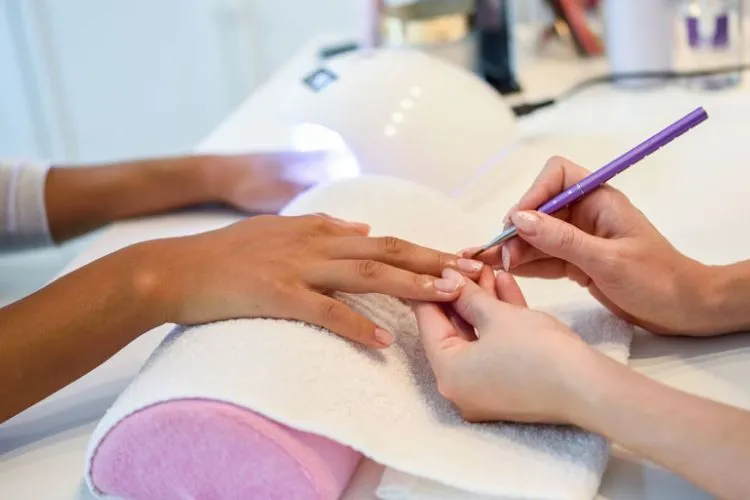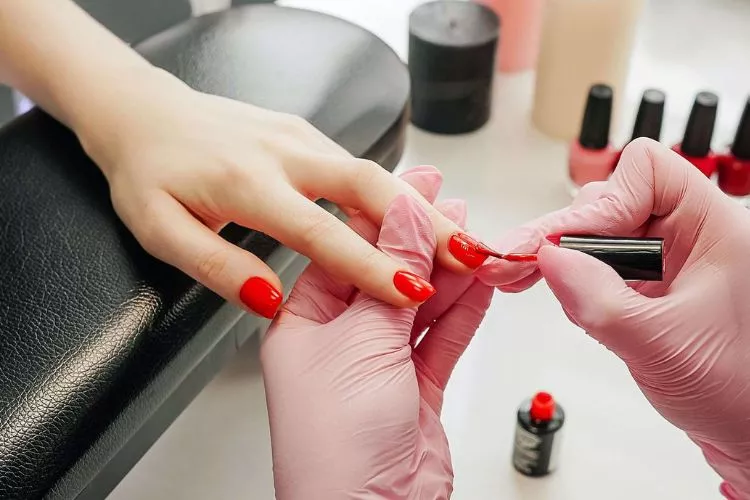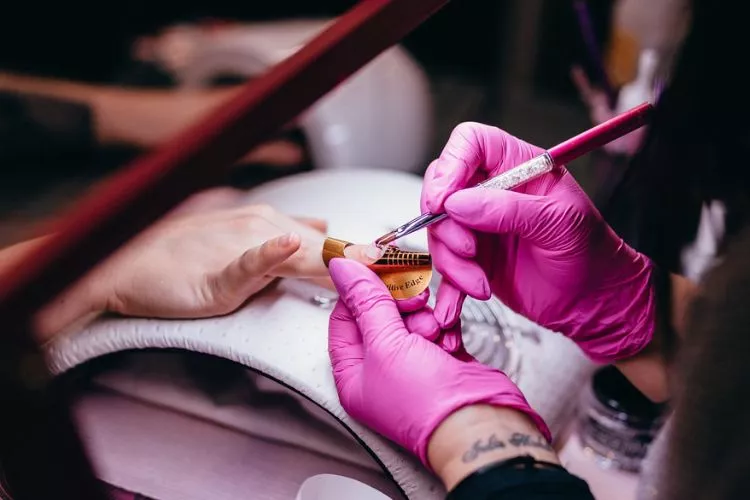In the world of beauty and personal care, nail services have always held a distinct place.
Many enthusiasts are exploring the possibility of offering these services from home.
But, do you need a license to do nails at home? Is it seriously a mandatory requirement?
This article delves into the intricate legal and professional aspects of providing at-home nail services, guiding individuals who yearn to transform their passion into a professional business.

Let’s decode the legalities and requirements together.
Do you need a license to do nails at home?
The requirements to perform nail services at home vary by state but most states require some form of licensing or certification even for home-based nail technicians.
Most states require completing a state-approved nail technician training program which includes both classroom instruction and hands-on practice.
After completing the program, technicians must then pass both a written and practical exam administered by the state cosmetology board.
Once licensed, home-based nail techs must meet the same health, safety, and sanitation standards as salon technicians such as having a separate room dedicated to services, proper ventilation, and keeping supplies and implements sanitized.
Ongoing continuing education is also usually required to maintain the license.
So in summary – yes, to legally perform nail services at home in most states you do need to obtain the proper nail technician license by completing training, passing exams, and meeting health code standards for home businesses.
How to get a license to do nails at home?
Getting a license to do nails at home typically involves several steps, which can vary based on regional laws and regulations. Below is a generalized guide to those steps:

- Complete a Nail Technician Program:
Most states or countries require that you complete a course from a professional nail technician or cosmetology school, both of which offer in-person and online options. These programs provide theoretical knowledge about nail anatomy, diseases, sanitation practices, and practical skills like nail art, extending, and filling. - Gain Hands-On Experience:
Many licensing boards require a certain number of practical hours. These hours can often be gained through apprenticeships, internships, or working under a licensed nail tech. - Pass a Licensing Exam:
After completing the required education and hands-on training, you will likely need to pass your licensing exam. These exams typically include both a written and a practical component to test your theoretical knowledge and technical skills. - Apply for a License:
Once you pass the exam, you can apply for a nail technician license through your local governing board. This process may include a background check. - Comply with Health and Safety Standards and Regulations:
To ensure the safety of you and your clients, it is crucial to adhere to the local health and safety standards and regulations. These typically include sanitation protocols and ensuring your workspace meets certain structural and ventilation requirements. - Get Business Permissions:
If you’re going to run the nail salon from your home, you may also need to obtain a business license or permit from your local jurisdiction. Consider insurance and check zoning laws to ensure it is legal to run a business from your home.
Remember, always check with the local licensing department or board in your location for precise requirements, as the process can vary widely from one place to another.
penalty for doing nails without a license
Practicing nail technology without a license can carry severe penalties, as it is considered illegal in many jurisdictions.
Although the exact penalties may vary from place to place, they often include substantial fines and potential jail time.
For instance, those convicted of practicing a profession without a license might face fines ranging from about $500 to $1,000 or more for misdemeanor offenses, and felony fines can exceed $5,000. More severe charges could result in incarceration.

Furthermore, if practitioners are discovered to have been operating without a license due to accidental harm caused to a client, the consequences may include additional fines, misdemeanor convictions, and potential lawsuits.
In Virginia, offering services like polishing, manicuring, pedicuring, or applying acrylic/gel artificial nails without a state-issued Virginia Nail Technician license can result in violation charges with a class 1 misdemeanor, including state fines and the potential for lawsuits by clients for damages3.
Remember, these penalties can vary depending on local laws and regulations, therefore it is always advised to check the laws in your area and ensure that your practice is compliant with them.
How much does it cost to start a nail business at home?
Starting a nail business at home involves various costs, and while the costs can vary widely depending on a range of factors, it’s crucial to have an estimation for budgeting purposes.
The largest chunk of your initial cost will go towards your education and licensure if you aren’t already a licensed nail technician. Tuition costs at nail tech schools can range from $3,000 to $5,000.
Thereafter, consider your location’s business permit and license-related expenses. For instance, costs of salon station permits can vary from $25 to $200. Acquiring business liability insurance, which could range from $100 to $500 annually, is another essential aspect.

Don’t overlook equipment and supply costs. The complete set of professional-grade nail tools, manicure tables, nail polishes, and other products may add another $500-$1,000 to your starting budget.
Factoring in costs related to marketing, hiring (if applicable), and creating a comfortable, presentable workspace in your home, you could be looking at spending anywhere from $5,000 to $10,000 to get started.
However, bear in mind these costs can vary based on your specific needs and your area’s requirements. Therefore, it’s always best to do some research and come up with a financial plan before proceeding.
frequently asked questions (FAQs)
Do you need a license to do nails at home in Canada?
A: Yes. In Canada, most provinces require an esthetician/nail technician license to offer nail services professionally, regardless of the location. This usually involves completing an accredited course and an examination.
Do you need a license to do nails at home in the UK?
A: Yes. In the UK, you need a special treatment license to run a salon from home. The requirements might vary slightly among different local authorities, but professional qualification and adherence to health/safety standards are emphasized.
Do you need a license to do nails at home in Texas?
A: Yes. Texas demands a manicurist license or cosmetologist license to provide professional nail services, including at home. The Texas Department of Licensing and Regulation oversees this licensing.
Do you need a license to do nails at home in Florida?
A: Absolutely. In Florida, it is obligatory to have a nail specialist registration, received upon completion of a board-approved nail specialty program and passing a state-board exam.
Do you need a license to do nails at home in North Carolina?
A: Yes. North Carolina requires manicurists to complete a state-approved course, pass an examination, and secure a manicurist license to offer their services professionally, including at home.
Do you need a license to do nails at home in Illinois?
A: Yes. Illinois necessitates a completed cosmetology or nail technology program, passing a licensure exam, and obtaining a nail technician license to provide nail services professionally, even from home.
Conclusion :
In summary, the necessity of having a license to do nails at home is largely contingent on the legislation and regulations in your specific location.
In most jurisdictions, providing a professional nail service at home without a proper license is against the law, primarily due to health and safety reasons.
If you are planning to offer such services, it’s not only critical but also ethical and professional to obtain necessary credentials, ensuring you are providing safe and reliable services to your clients.
In all situations, it is advisable to perform due diligence and seek legal counsel to understand the requirements and restrictions placed on home beauty services in your area.
Becoming officially certified not only legitimizes your business, but also sets a high standard of service, trust and professionalism, affirming client’s loyalty and your reputation in the long run.
